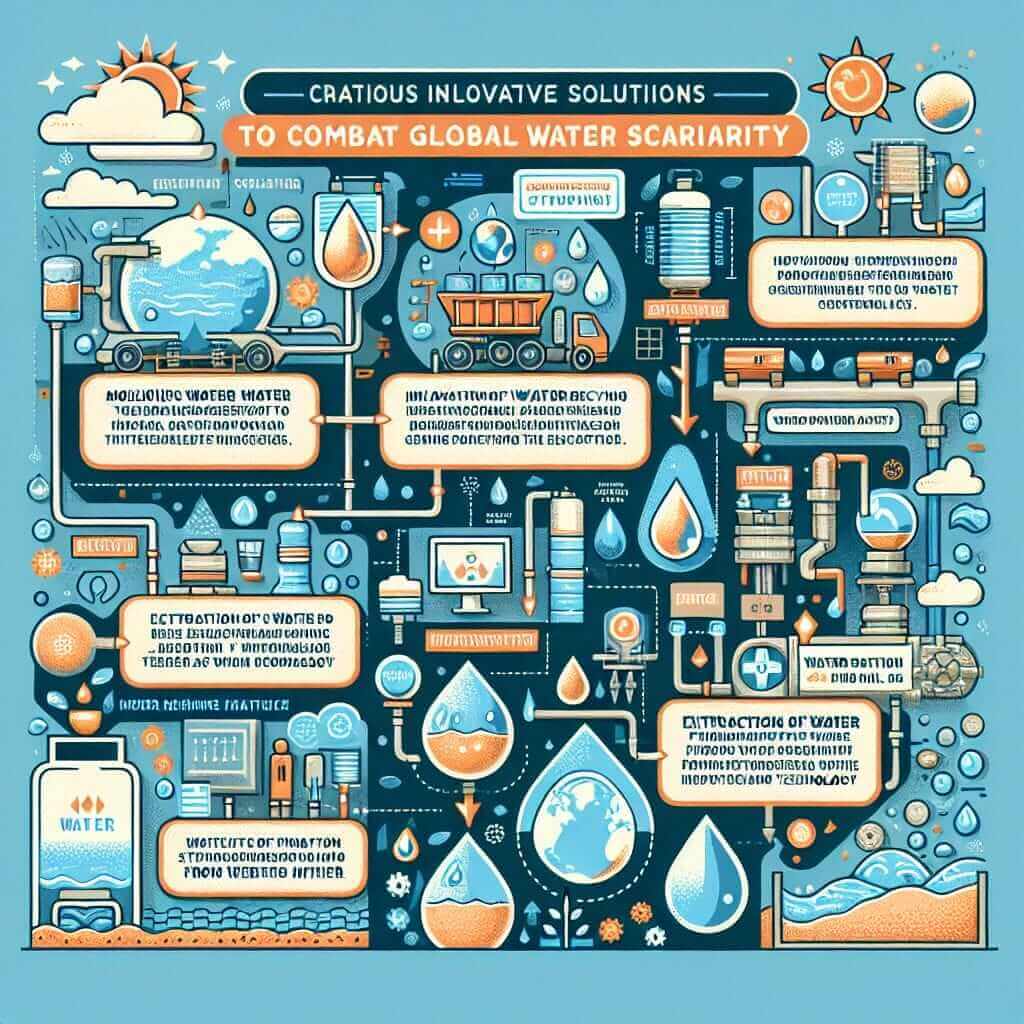The IELTS Reading component tests one’s ability to comprehend and interpret various passages accurately. Topics related to environmental issues, including global water scarcity, appear frequently in the examination. As water scarcity becomes a pressing global concern, it is crucial to familiarize oneself with the terminology and challenges linked to this topic. Understanding the potential focus areas can provide an added advantage in predicting and tackling the test content effectively.
Practice Reading Passage: Global Water Scarcity Solutions
Passage
Water scarcity is a critical global issue that intensifies with population growth, urban expansion, and climate change. While some regions face acute shortage, others have to contend with water pollution and wastage. This passage explores potential solutions to alleviate global water scarcity.
Local and Indigenous Solutions
One approach to managing water scarcity is through local and indigenous techniques. Traditional water conservation methods, like rainwater harvesting and the construction of check dams, offer sustainable, low-cost options. These methods have been practiced for centuries in several cultures and have proven effective in maintaining local water supplies.
Technological Innovations
On the technological front, advancements like desalination and water recycling present robust solutions. Desalination, which involves converting seawater into potable water, is particularly crucial for arid regions. Countries like Saudi Arabia and Israel have successfully implemented large-scale desalination plants. Simultaneously, water recycling processes, where wastewater is treated and reused, have gained traction globally.
Policy and Governance
Effective water management policies are vital to address water scarcity. Governments must implement stringent regulations on industrial water usage and promote efficient agricultural practices. International collaboration is essential to ensure transboundary water management. Enhancing water pricing policies can also discourage overuse and waste.
Community Awareness and Education
Raising community awareness about water conservation is paramount. Educational programs that inform citizens about sustainable water usage practices can induce significant behavioral changes. Schools and local organizations play a crucial role in disseminating knowledge and fostering a conservation-minded community.
Climate Change Mitigation
Addressing climate change, a contributing factor to water scarcity, is imperative. Reducing greenhouse gas emissions and investing in renewable energy sources can mitigate climate-related impacts on water resources. Climate adaptation strategies, like constructing resilient infrastructure, are necessary for regions prone to climate-induced water shortages.
Questions
1. Multiple Choice
-
What is the primary benefit of traditional water conservation methods?
- A. They are expensive and complex.
- B. They are sustainable and low-cost.
- C. They require technological advancement.
- D. They are ineffective in maintaining water supplies.
-
Which country is known for its large-scale desalination plants?
- A. India
- B. Brazil
- C. Saudi Arabia
- D. China
2. True/False/Not Given
- Traditional water conservation methods have only been practiced in the last century. ( )
- Water recycling processes involve treating and reusing wastewater. ( )
- Effective water management policies are not necessary for addressing water scarcity. ( )
3. Matching Information
Match the following potential solutions with their descriptions:
A. Desalination
B. Water recycling
C. Policy reforms
- Treating wastewater for reuse. ( )
- Converting seawater into potable water. ( )
- International collaboration for transboundary water management. ( )
4. Sentence Completion
- Raising community awareness about water conservation can lead to ____.
- Reducing greenhouse gas emissions can help ____.
Answer Key
Multiple Choice
- B. They are sustainable and low-cost.
- C. Saudi Arabia
True/False/Not Given
- False
- True
- False
Matching Information
- B. Water recycling
- A. Desalination
- C. Policy reforms
Sentence Completion
- significant behavioral changes.
- mitigate climate-related impacts on water resources.
Common Mistakes
One common mistake students make in the IELTS Reading section is not thoroughly understanding the passage before attempting to answer questions. Misinterpreting keywords and failing to recognize synonyms can also lead to errors. Practice with various passages helps in recognizing these patterns and improving accuracy.
Vocabulary
Here are some crucial vocabularies from the passage:
- Scarcity (/ˈskersəti/), noun: Insufficiency or shortness of supply.
- Desalination (/diːˌsælɪˈneɪʃən/), noun: A process that removes minerals from saline water.
- Conservation (/ˌkɒnsərˈveɪʃən/), noun: The protection and preservation of the environment.
- Potable (/ˈpəʊtəbl/), adjective: Safe to drink.
Grammar Focus
Understanding conditional sentences is vital for comprehending cause-effect relationships often highlighted in scientific passages. For example, “If water scarcity continues, it will lead to severe agricultural downturns.” The structure here is “If + present simple, will + base verb”.
Tips for High IELTS Reading Scores
- Skim through the passage first to get the main idea.
- Highlight or underline keywords as you read.
- Read the questions carefully, ensuring you understand what is being asked.
- Identify and note synonyms in the text.
- Practice extensively with different types of passages to build speed and accuracy.
For further practice, you may explore related topics like The Effects of Climate Change on Freshwater Resources and The Impact of Climate Change on Water Resources.
By following these strategies and familiarizing yourself with a diverse range of reading materials, enhancing your IELTS Reading score becomes more attainable.

Harness these tips and continue practicing to secure your desired Band score in the IELTS Reading section. Good luck!